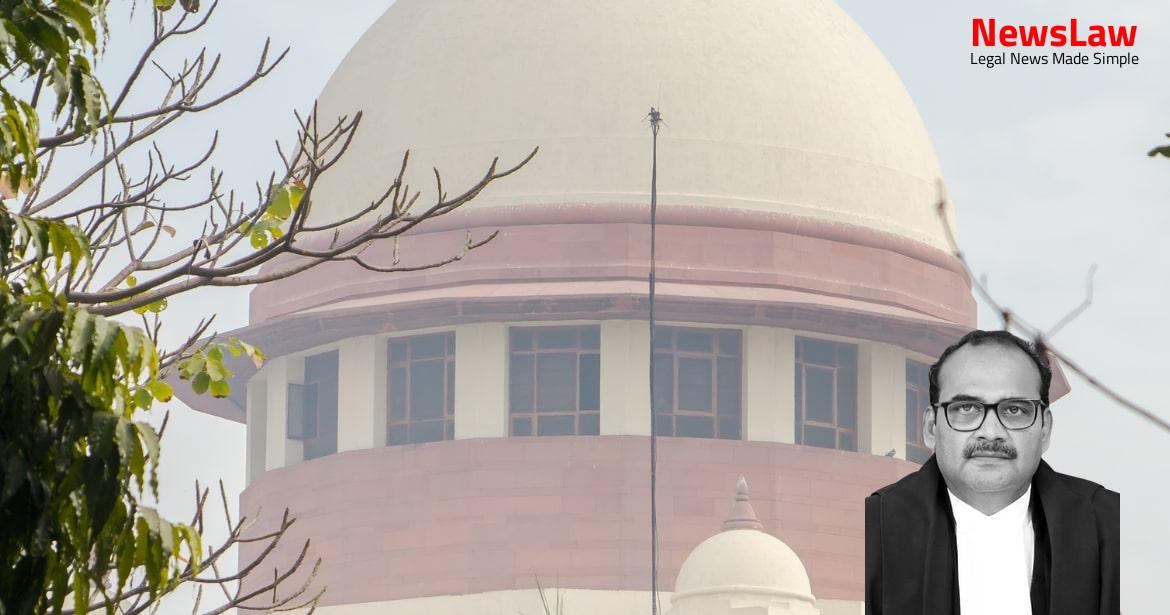The Supreme Court of India recently ruled on the case of State of Rajasthan vs. the Life Insurance Corporation Of India(LIC) (Appellant) regarding the imposition of stamp duty on insurance policies. The judgment addresses the legislative competence of the state government, taxation regulations, and the applicability of the 1952 Act and 1998 Act. This landmark decision sheds light on crucial aspects of stamp duty laws and their impact on insurance transactions within the state.
Facts
- The Inspector General (Registration and Stamps) Rajasthan, Ajmer ordered the appellant to deposit various sums of money for causing revenue loss to the state of Rajasthan by purchasing insurance stamps from Maharashtra for policies issued in Rajasthan.
- Multiple orders were passed between April 2004 and November 2004 for different amounts ranging from Rs. 43.68 lakhs to Rs. 1.87 crores.
- The Additional Collector (Stamps), Jaipur issued a show-cause notice under Section 37(5) of the Rajasthan Stamp Act, 1998 for payment of the disputed amounts.
- The Additional Collector confirmed the show-cause notice and directed the appellant to deposit the disputed amount after clarifying that the stamps in question were not ‘India Insurance Stamps’.
- The Treasury Officer, Jaipur informed the appellant that ‘India Insurance Stamps’ are the property of the central government, and their supply and distribution are not related to the department.
- According to prevailing stamp duty laws, the appellant was required to affix stamps and pay duty on insurance policies issued by them as per the Indian Stamp Act, 1899 adapted to Rajasthan by the 1952 Act.
- The appellant filed a writ petition challenging the Additional Collector’s order, which was dismissed by the High Court single judge citing the availability of an alternative remedy under Section 65 of the Rajasthan Stamp Act.
- If dissatisfied with committee decision, party can file for revival of writ appeal
- Committee rejected appellant’s representation
- Writ appeal restored and decided in impugned judgment
- High Court directed Chief Secretary to constitute High Powered Committee
- Committee to decide the matter by a reasoned order
- High Court confirmed 1952 Act enacted under Entry 44, List III with Presidential assent
Also Read: State of M.P. v. Pernod Ricard India Ltd. : Legal Interpretation of Substituted Rules
Issue
- The issue for consideration is whether the state of Rajasthan has the power and jurisdiction to levy and collect stamp duty on policies of insurance issued within the state.
- Whether the state government has the legislative competence to impose and collect stamp duty on policies of insurance as per Entry 91 of List I read with Entry 44 of List III.
- Whether the 1952 Act requires the purchase of insurance stamps from and payment of stamp duty to the Rajasthan government for insurance policies issued within the state.
- Whether the 1952 Act or the 1998 Act applies to the facts of the present case.
Also Read: Case Analysis: National Consumer Disputes Redressal Commission vs. Promotional Trailer Deception
Arguments
- ARG_PETITIONER: The learned ASG argues that the state of Rajasthan lacks the legislative competence to impose and collect stamp duty on insurance policies as it falls under the Union List.
- ARG_PETITIONER: The proceedings are under the 1998 Act, which does not provide for the imposition of stamp duty by the state on insurance policies.
- ARG_PETITIONER: The High Court’s reliance on Section 3A for payment of stamp duty in cash in case of unavailability of stamps is argued to be misplaced as it specifically excludes instruments specified in Entry 91 of List I.
- ARG_PETITIONER: The imposition of stamp duty by the state is challenged as being contrary to the constitutional scheme and specific state enactments.
- ARG_PETITIONER: The learned ASG contends that stamp duty cannot be imposed without a clear rate of taxation, which is not provided in this case.
- ARG_PETITIONER: Referring to Entry 47 of List I and Entry 91 of List I, the ASG argues that only the Union has the power to prescribe the rate of stamp duty on insurance policies, rendering the state government’s demand for stamp duty invalid.
- ARG_PETITIONER: The ASG points out that since Section 3 of the 1998 Act does not indicate any specific rate of stamp duty for insurance policies, the state government’s demand for stamp duty is unfounded.
- ARG_PETITIONER: Points out that Entry 44 of List III is not a taxation entry and relies on specific cases to support this argument.
- ARG_PETITIONER: The ASG emphasizes that the appellant had no choice but to purchase stamps from outside Rajasthan due to unavailability, supported by Sections 3A(4) of the 1952 Act and 4(4) of the 1998 Act.
- ARG_PETITIONER: Highlighting the lack of domain competence of the state to prescribe stamp duty rates, the ASG argues that the state cannot validly impose and demand such duty.
- ARG_PETITIONER: The appellant’s submission regarding the state government’s power to demand payment for insurance stamps being under the Union List is rejected by the High Court.
- ARG_PETITIONER: The High Court’s rejection of the appellant’s reliance on VVS Rama Sharma v. State of Uttar Pradesh is based on a differentiation in the applicability of state laws in the two cases.
- ARG_PETITIONER: The ASG concludes that the appellant had to purchase stamps from outside Rajasthan due to the absence of availability, as non-payment of duty would render the insurance policy inadmissible in evidence.
- The learned ASG for the appellant and Dr. Manish Singhvi for the respondent have presented their arguments.
- The differentiation from VVS Rama Sharma case was highlighted, where criminal case registration against LIC officers was quashed due to lack of criminal intent.
- It was argued that even if the 1998 Act applies, Sections 90 and 91 adopt the Indian Stamp Act for instruments in Entry 91 of List I.
Analysis
- The High Court relied on Sections 2, 3(v), and 3A of the 1952 Act read with Rules 2(d) and 3 of the Rajasthan Stamp Rules, 1955.
- Legislative competence is discussed, emphasizing that the state has the power to collect stamp duty on insurance policies under state enactment.
- Detailed analysis of the constitutional scheme and distribution of legislative competence with respect to legislation on stamp duty under various entries in the Seventh Schedule.
- Discussion on the applicability of the 1952 Act and the 1998 Act in imposing stamp duty, with a conclusion that the state can levy duty based on rates prescribed by the Parliament.
- Arguments on the purchase of insurance stamps from outside the state, highlighting the obligation to pay stamp duty to the state government.
- Differentiation from VVS Rama Sharma case regarding purchase of stamps from specific sources for instruments executed within the state.
- Explanation on the validity of the charging provision of stamp duty under the state government, asserting legislative competence under Entry 44 of List III.
- Clarification on the exclusivity of Parliament’s power to prescribe rates of stamp duty on specific instruments.
- Detailed examination of the legal provisions and rules under the 1952 Act regarding stamp duty payments and purchase of stamps.
- Rejection of contentions regarding lack of legislative competence of the state and affirmation of the power to levy and collect stamp duty under the Rajasthan Stamp Law (Adaptation) Act, 1952.
- Under Entry 44 of List III, the power to levy stamp duty on all documents is concurrent.
- The power to prescribe the rate of such levy is excluded from Entry 44 of List III and is divided between Parliament and the State Legislatures.
- The charging provision for imposition of stamp duty, even on documents contained in Entry 91 of List I, can be enacted by both the Parliament and the state legislatures, subject to the provisions of Article 254.
- In VVS Rama Sharma case, the Court interpreted Rule 115A of the UP Stamp Rules, 1942 along with the Indian Stamp Act, 1899.
- Entry 91 of List I of the Seventh Schedule would be applicable, and States cannot circumvent Central laws.
- The State of UP cannot mandate that stamps on insurance policies must only be purchased within the state.
- The power to levy stamp duty on documents is concurrent under List III, but the rate of levy is divided between Parliament and State Legislatures.
- Payment of stamp duty falls under Entry 44 of List III and pertains to taxation.
- The 1952 Act prevailing over the Indian Stamp Act in Rajasthan received Presidential assent.
- Stamp duty is a tax and must be levied and collected by the ‘authority of law’.
- Stamp Rules framed by the State under the central Act cannot circumvent provisions of the central Act.
- Section 3A of the stamp duty act allows for payment of stamp duty in cash when stamps are not available in sufficient quantity.
- The instrument must be paid to or collected by any Government treasury in cash, with a receipt or challan provided.
- The officer-in-charge of the Government treasury must endorse the instrument with the stamp duty paid in cash and cancel the receipt or challan.
- Once endorsed, the instrument is deemed to be duly stamped and can be used for all purposes.
- The state government is directed not to demand and collect stamp duty as per certain dated orders.
- The appellant must purchase India Insurance Stamps and pay stamp duty for executing insurance policies in Rajasthan.
- State legislature has the authority to impose and collect stamp duty on insurance policies under specific entries in the lists.
Decision
- The appeals were dismissed and the judgment of the High Court dated 21.02.2011 was affirmed.
- Certain findings of the High Court were set aside as indicated in issue no. IV.
- The State Government was directed not to demand and collect stamp duty as per specific orders dated 16.09.2004, 16.10.2004, 11.10.2004, 01.11.2004, and 28.10.2004.
- Each party was instructed to bear their own costs.
Case Title: LIFE INSURANCE CORPORATION OF INDIA Vs. THE STATE OF RAJASTHAN STATE OF RAJASTHAN AND ORS. SECRETARY (2024 INSC 358)
Case Number: C.A. No.-003391-003391 – 2011



